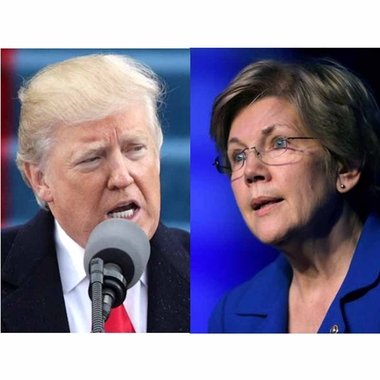Bully in Chief: Donald Trump proves it again with his 'Pocahontas' attack

It's not an exaggeration to say that Donald Trump insulted his way to the White House.
His run to the Republican nomination was defined by his bullying of rivals -- from "Low Energy" Jeb Bush to "Lyin' " Ted Cruz. Trump spent the general election doing much of the same with "Crooked" Hillary Clinton, insisting that she lacked the stamina and brainpower to be president.
Voters -- or enough of them in the right states -- saw Trump's name-calling and insults as toughness. Or a rejection of politics as usual. Or just plain funny.
He won. And, despite pledges to be so presidential we would all be bored, Trump has turned from an insult-driven candidate to an insult-driven president.
The latest example came Monday afternoon during an event honoring Navajo code talkers.
"I just want to thank you because you are very, very special people," Trump told the gathered group. "You were here long before any of us were here. Although, we have a representative in Congress who has been here a long time ... longer than you -- they call her Pocahontas!"
(Trump referred to his nickname for Sen. Elizabeth Warren, "Pocahontas" -- a label he has long used for the Massachusetts Democrat -- while standing in front of a portrait of President Andrew Jackson, his political idol, who instituted a policy of "Indian removal" from a handful of states -- a forced exodus known as the "Trail of Tears.") Pocahontas was a historical character from the 17th century, and many Native Americans say that using her name in a disparaging way insults native peoples and degrades their cultures.
Trump's "joke" went over like a lead balloon in the room. The pool report described the reaction this way: "(Awkward silence in room.)" You can watch it for yourself here.
Here's how one of the honorees reacted. (GIF courtesy of CNN's Brenna Williams.)
The simple and irrefutable fact here is that Trump, since the moment he became a candidate, has not simply rewritten the rules of how someone running for president -- or elected president -- acts. He has made political hay out of flouting these rules -- dismissing them as musty relics of politics as usual. Anyone who blanches at his insults or suggests that he is defining the presidency downward just doesn't get it (or him). In Trump's own mind, all he is doing is freaking out the squares.
Insults, of course, are not policies. And bullying is not a strategy.
Trump either doesn't understand that, doesn't care or is simply incapable of moving beyond a political philosophy that would be recognizable to any grade school bully.
He called Warren "Pocahontas" -- a reference to the fact that she has claimed Native American heritage -- because a) he thought it would be funny and b) he knows his base eats up these insults. That using that word, which some Native Americans consider a racial slur, in the context of an event honoring code talkers -- or in front of a painting of Jackson -- might offend someone might well have not even occurred to Trump. And, if it did, he likely did it anyway as a way to attack the so-called "snowflake" culture on the left.
When White House press secretary Sarah Sanders was asked about the moment in her daily press conference, she argued the word "Pocahontas" was not a slur and quickly sought to change the subject to Warren: "What most people find offensive is Senator Warren lying about her heritage to advance her career."
Look. There's no question that Trump's base, when they hear about this kerfuffle, will laugh at the reference and revel in the fact that the so-called "fake news" media made a big deal out of it. That's fine.
But just because you laugh at bullying or cast rank incivility as a rejection of an overbearing political correctness culture doesn't make it -- or you -- right.
There are lots and lots of ways that Trump's candidacy and presidency have changed, are changing and will change not just our politics but also our culture. Perhaps the most damaging is that his obsession with insults and feuds sends a message that name-calling and bullying are just fine as long as you are doing it to "people who deserve it."
That is the sort of genie that is impossible to put back in its bottle even after Trump leaves office. The mainstreaming of incivility and insults will have an impact long after Trump leaves the White House.
Analysis by Chris Cillizza, CNN Editor-at-large. The-CNN-Wire ™ & © 2017 Cable News Network, Inc., a Time Warner Company. All rights reserved.
The Gayly – November 27, 2017 @ 5:15 p.m. CST.





